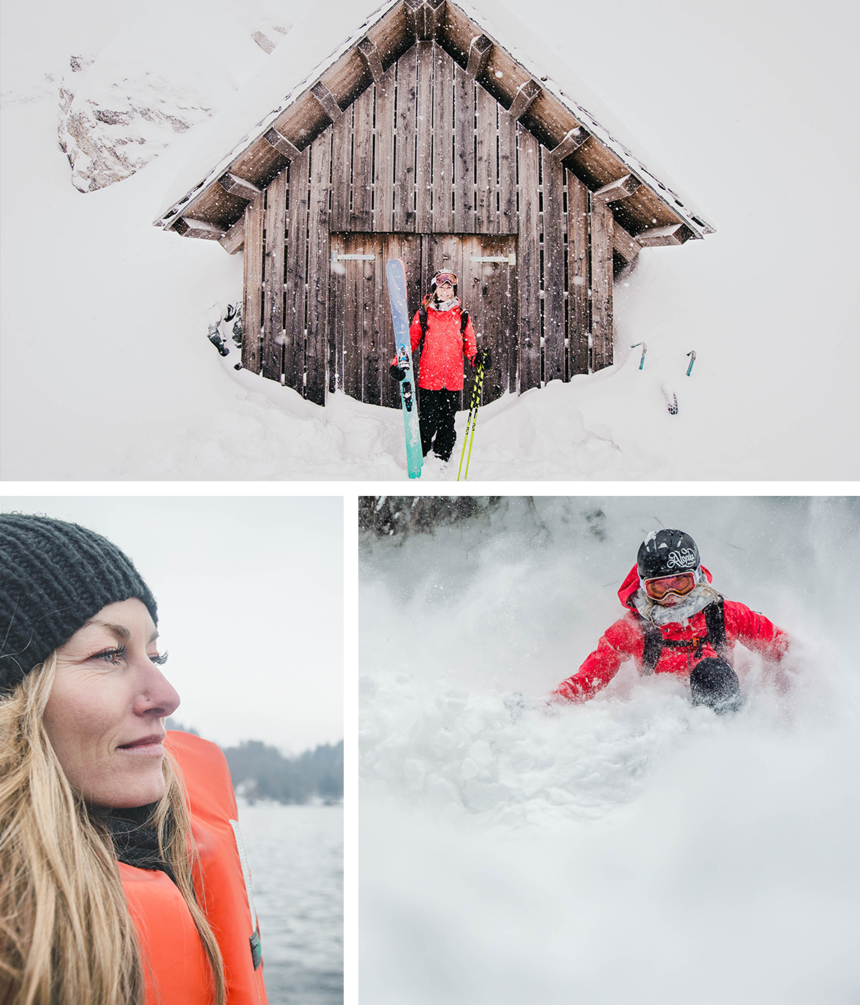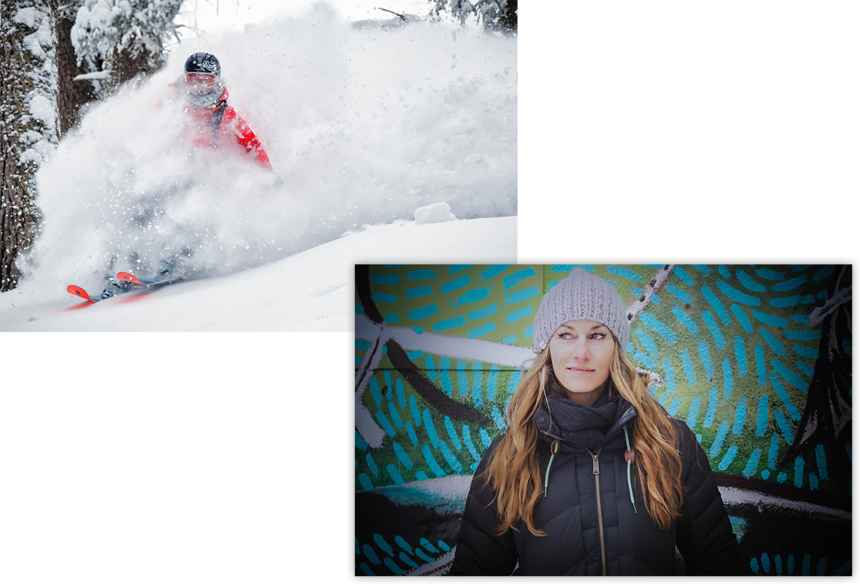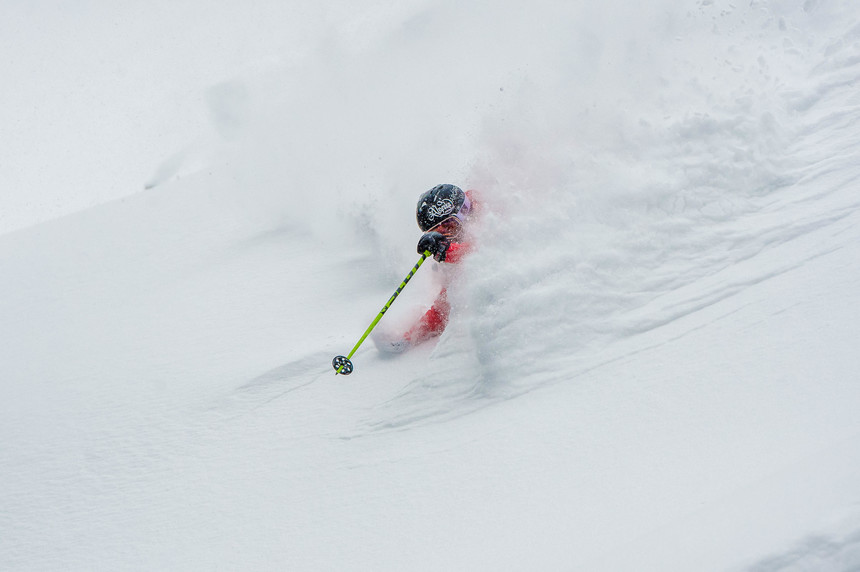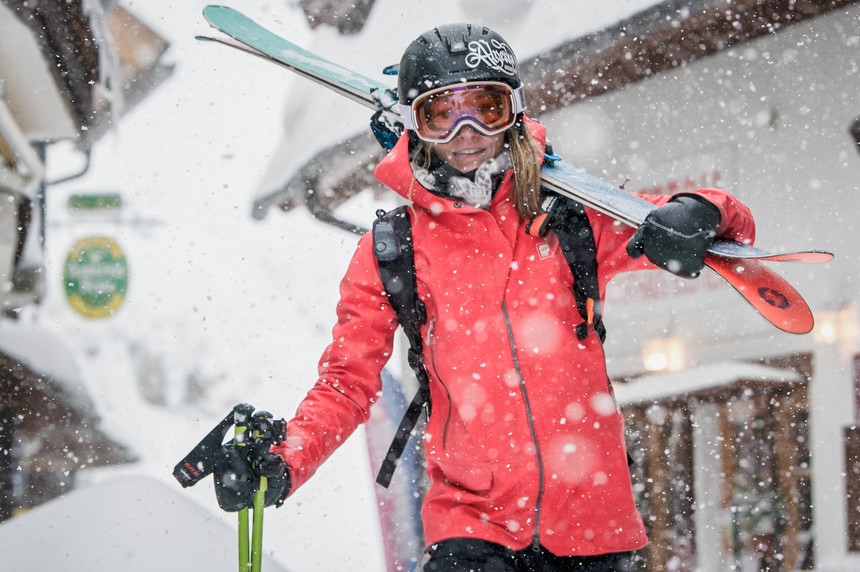
The Far Out Ones: Elyse Saugstad
Story by Hadley HammerAs a third-generation Alaskan, Elyse Saugstad was born and bred in some of the gnarliest mountains on earth. With skiing literally running through her veins, she took the ski world by storm, winning the overall Freeride World Tour title in 2008, and stacking film segment after film segment ever since. In 2013, she turned heads at TGR with her Co-Lab edit, which landed her spot on the TGR roster for future films like Rogue Elements and Far Out. Her Alaskan upbringing also instilled a deep respect for the mountains and outside of skiing, she helps educate the next generation of freeskiers in backcountry and mountain safety through her SAFE AS clinics, a series of women’s avalanche classes. Even as a teacher, she recognizes the need for an open mind and knowing that there is always more to learn and there’s always room for more hard work. It takes drive and commitment to make it as a pro, and a lot of love for the sport to have a career as long and successful as Elyse Saugstad’s. We sat down with Elyse to dive into her headspace - to figure out how she keeps skiing at the top of her game for well over ten years. This year, Saugstad joined Robin Van Gyn and Griffin Post in Slovenia’s Julian Alps, testing the limits of their patience before getting to shred and learn new tricks in epically deep snow. Check out the segment in this year’s Far Out, Presented by REI.
You’ve had an incredibly long ski career. What do you think is the driver behind your skiing?
You know it’s funny, I think about this kind of stuff all the time. It’s still a big question mark for me. Because the thing is, when you’ve been a professional skier for as long as I have been, there’s a lot of parts to being a pro that make it so much of a job and it really takes away the allure of it. When you make anything a job, it makes it not quite as sexy, not quite as romantic. And I wonder, at this point in my career, what is it that drives me to ski, because there are days when you go out or film trips you go on when everything is there-cool trip, cool people, and you’re so lucky and so why are you not super excited about. To be totally honest, at a certain point, it's not always peaches and cream, because it's a job. And you need to perform at your job. So how do you move past feeling stale? Everyone feels stale at their job. How do you stay motivated? Luckily the act of skiing, especially when it involves powder, helps to get you going. When you actually get into the moment and you’re outside, it elevates your sense. It turns you on internally. So the physical side of skiing, helps the mental side. It’s a literal snowball effect.

While the filming process is typically slow, the Slovenia trip proved otherwise - and provided plenty of bottomless pow. Nic Alegre photos.
Exactly. The filming process is pretty slow. You’re taking one or two runs a day sometimes.
Right. There’s a lot of standing around. A lot of waiting. Waiting on light, on cameraman, on snow, on people. You feel like you don’t really ski half the time. It seems so glamorous. The part that helps that is when you have a really good crew that you’re working with. By having a good crew, it keeps that process jovial. You can have amazing conversations during the waiting time. The trip I went on to the Julian Alps, was just that. It was an awesome crew. And we didn’t stand around too much. We were constantly moving.
Can you talk about partnerships you’ve had in the mountains with people you’ve filmed with.
That’s a hard part of what we do. We don’t always have a choice of who you’re on a trip with. Luckily film companies are pretty good at knowing who works well with. For this particular trip, when I saw the email chain that had Robin Van Gyn was going to be on the trip, I just instantly thought this was going to be all-time. And to get the chance to finally film with Griffin Post. We’ve been friends for so long, but haven’t gotten to work together. I really admire his skiing and work ethic. Our careers kicked off at the same time, competing on the Freeride World Tour together and then transitioning to filming. And then Robin is a really close friend. We’ve gone on surf trips. She’s someone that I’ve always wanted to get into the mountains with. But generally with females it’s one female per crew. And we don’t have any similar sponsors. And as a skier we rarely have a chance to film with snowboarders. So TGR really broke some molds there.

Saugstad knows how to keep herself and her career going. Nic Alegre photos.
Yeah what is with that-separating skiers and riders?
You know a lot of it is with the marketing. A lot of companies don’t see the purpose of having that crossover, which is fair.
What did you learn filming with Robin?
One of things about Robin, is that she has so much energy and constant drive. It’s infectious. She feels like there is something always to be done. On the crews I’m usually filming with, they are big-mountain oriented. It’s rare I’m with people that just want to build kickers. One of the days, when the snow wasn’t as good, Robin suggested we build a kicker. And it broke my normal film routine, which was awesome. We started doing backflips. And then she decided to try a double backflip. She had never stuck one before. And with her determination, she did many many tries, took some impressive diggers, and then stomped it. It was so freaking rad to see. To see another female stick another backflip, that was so cool. We had just an all-time day.
Do you set goals for year or your career?
I do to a certain extent. There’s a fine line with how you set goals as a big mountain skier. Say with tricks-it’s easy to see the progression of how you improve-you land switch, add an extra grab, add an extra rotation etc. With big mountain, it’s harder to define that progression. Like I want to ski something with a bigger rollover, or something that has multiple airs. Those things aren’t as quantifiable. It’s discernible when you watch it, but hard to say “I went five feet bigger on my last air and that’s a huge accomplishment”. So I try to be careful with goals, because it’s easy to get over your head. With tricks maybe you'll take some extra diggers, but with big mountain you’re inevitably stepping up your exposure and consequence.
It seems like you’ve always taken it into your own hand. Whether it is snowmobiling or competing or filming-you’re not waiting for anyone to push you or help you, you just create that step yourself.
Well, it was taking my career in my own hands instead of waiting for opportunities. There were some things that happened with sponsors and when I was younger, and on top of that film companies really stuck with the one female formula. It made it hard for someone like me to break in when those spots were filled. So I thought, I’m not going to sit around and wait, I’m just going to create my own content. And luckily with the internet, it was possible. Things like getting a snowmobile opened up more doors for me as well. It became my own heli.
Things like getting a snowmobile opened up more doors for me as well. It became my own heli.
It’s challenging to ride, it takes so many years to get good at it. I was trying to just not be the weak link on the snowmobile. The silver lining to all the struggling was that I just got out there way more. I really got to ski a lot.
TGR ran their grom contest this year. And they really were pushing the females. They had a female only prize but only six girls submitted. And I asked TGR how do we get more girls? When you entered the TGR film contest-it seemed like it shifted your career. What would you tell girls to do the same?
You know this year the Grom contest has its own division for the girls. To me that makes it far less daunting. You’re competing with your peers-not the guys. We ski different. Of course we can do things well. I think about myself compared to my husband Cody. He’s just a bigger, stronger dude-no way around that. He can send bigger cliffs than me, because of his size. I didn’t have the mentality that I was going to win. I had the mentality that I’d be in the top ten. That I could hang with the boys in that way. You have to give yourself that opportunity. There’s such a divide in our society with sports in general-it’s always separate. So for women it can be hard to just give it a shot. But that was my approach-just put myself out there. And it worked out.
The thing is, that approach to life-like what do you have to lose, that gets you further. If you can, remove yourself from feelings like you’re going to fail by trying. There’s not a single professional athlete in the world that is against trying. If you’re not willing to put your neck out there, willing to fail, then you’re not going to succeed. One of the most amazing scientist, I think he’s a neurologist, David Eagleman, he said with science, when you have people trying to come up with things and they get stuck on one idea and trying to make it work-they are the most dangerous because they are just going to spend all their time trying to prove their own theory works. Science should be more like throwing spaghetti at the wall and seeing what sticks. That’s how I want to approach skiing. When you asked about goals and how I push myself, and one of the things I hadn’t done until this year was get a backflip on film. It’s hard to pull yourself out of just playing it safe and just doing big mountain lines, especially with how short winter is and how precious good film days are. This trip with TGR, we only had two weeks. That’s not a lot of days. So you have to do what you know will make the film. You risk ending up with nothing if you take too many chances, which means you didn’t do your job. It’s hard to step out of that, and take chances. But that trip I took a chance. It was rad to have that accomplishment this far along in the game.
Yes!! I felt the same way. I wanted to have a 360 in my segment. Even if all little kids can do it, it’s still important to me. I mean there are so many elements of skiing and it can be difficult to master all those things, especially with how short winter is. But having those goals help to keep your skiing progressing.
Yes. It’s hard to find that time for improvement. For me, the beginning of the season is when I try to get that progression in. But you’re not always guaranteed that time. There are so many other obligations. But that’s my advice for people coming up, is take all the time you can really pushing yourself...because the more “pro” you are, the less time you have for that.

Exactly. I feel like when people ask me “how do I get sponsored”, and my answer is always ski as much as you can. Do comps, they give you a reason to be focused, but also ski a tremendous amount. Let your skiing do the talking. Give yourself a platform to stand on. The sponsors will come. Just do the summer job hustle and then ski a ton in the winter.
Yes! Your value isn’t correlated to the fact that your sponsored. There are plenty of professional skiers, including myself, who go through periods of time that they are barely getting paid. The year after I won best female performance, I was pretty much sponsor-less. You can’t hold your worth in just sponsorship.
What was your inner headspace like that year? When you’re stuck between winning this huge core accomplishment and not getting paid?
At the time my relationship with my main sponsor had eroded so much-there was such a lack of support, that at that point I had already taken so much of my career into my own hands. I learned to become really efficient with the little money I had far before that year. So I had an ownership of my career that was separate from sponsors. It just became a bump in the road instead. You know in a little way you can kinda give the bird to the industry to a little bit. But you also can’t take it personally. It wasn’t personal, it was just where the industry was at. I just was doing what was making me happy and it was so satisfied with what I accomplished with skiing. And I have an amazing husband who to be totally transparent, could help me out. He could pick up the little pieces of our life so I could keep going.
I mean from the outside, it just seems like you have such a clear sense of your worth. Yeah. And luckily it all paid off. I kept at it. I have amazing sponsors now with a tremendous amount of support. Those relationships are great. You know it is like any career. If you do it long enough, you’re going to have bumps in the road. And you have to be strong enough to endure that ride. What you want to accomplish in life is what matters.
How do you define success?
Well, the fact that I’m the age that I am, and that I’m still a player in the industry. And not even just for my age, but for the length of my career, and that I still have the motivation. Full circle to the beginning of our conversation. What we do is so mentally draining, and physically draining. I didn’t have to have surgery till two years ago now. And that injury was an over time, beat up, too much hard playing kind of injury. It made me come to terms with the effects of playing hard your whole life. My body was telling me that I needed to reset. I want to be able to ski the rest of my life.
My body was telling me that I needed to reset. I want to be able to ski the rest of my life.
So it is really important to me to pay attention to those things. It’s really important to treat my body well. I definitely have changed my lifestyle as a professional skier from the beginning to now. A lot of people see skiers as these partiers. And it’s something I don’t really do anymore, because I want to continue to be at the top level. So you have to start sacrificing.
You have this reputation around your physical and mental fitness. And you know as a freeskier, unless you’re sponsored by Red Bull, you’re really doing your own programs. You’re figuring out how to stay strong, how to recover from injury, how to eat. I always think, what could we all do if we had access to the training and recovery tools that say professional football players have?
I dream about how amazing it would be to be one of those kind of athletes. To have body workers on call. To have someone realign your body after a 40-foot cliff drop. For free! It would be amazing. It used to exist. At least back in the day with park skiers. That was a thing. In the Simon Dumont era-they’d have those trainers there for them. It certainly isn’t like that now. I’m thankful that I did sports as a young age and picked up a lot of information on how to do all of that on your own. You know it’s so funny, when you’re being candid and truthful and honest, it doesn’t always sounds positive. It’s interesting in these articles on how to be honest and real without being negative. But I think it’s important to take all that on, because at the end of the day I still feel so lucky to be able to do what I do. It’s still mind blowing. If you have the mental drive, and the discipline to take care of your body, there’s no stopping you.

